Favorites takes a lighter approach to the material we normally cover. Each week, we will take you through a list of favorites—whether it’s moments, scenes, episodes, characters, lines of dialogue, whatever!—in bite-sized articles perfect for your lunch break, a dull commute, or anywhere you need to take a Moment of Zen. So, sit back and enjoy this week’s offering: Brian Krikorian’s favorite fictional songs in film and TV.
Every once in a while, a work of fiction calls for the creation of a song that exists only within the world of the story. There’s a rich tradition of clever fakes designed expressly to meet story demands, from the Gershwins’ donation of discarded lyrics for the hapless songwriters in Billy Wilders’ Kiss Me, Stupid to the majestically idiotic rock songs in Rob Reiner’s This Is Spinal Tap. On first listen, many of these counterfeits would seem to avoid subtlety altogether, and there is always an element of parody involved. But the most interesting ones display a deceptive depth, hitting their broader targets while also illuminating key aspects of character, plot and theme. In some cases, they can evoke entire worlds within worlds and invite us to dream along. Here are a few.
“Tennis Night” from 30 Rock
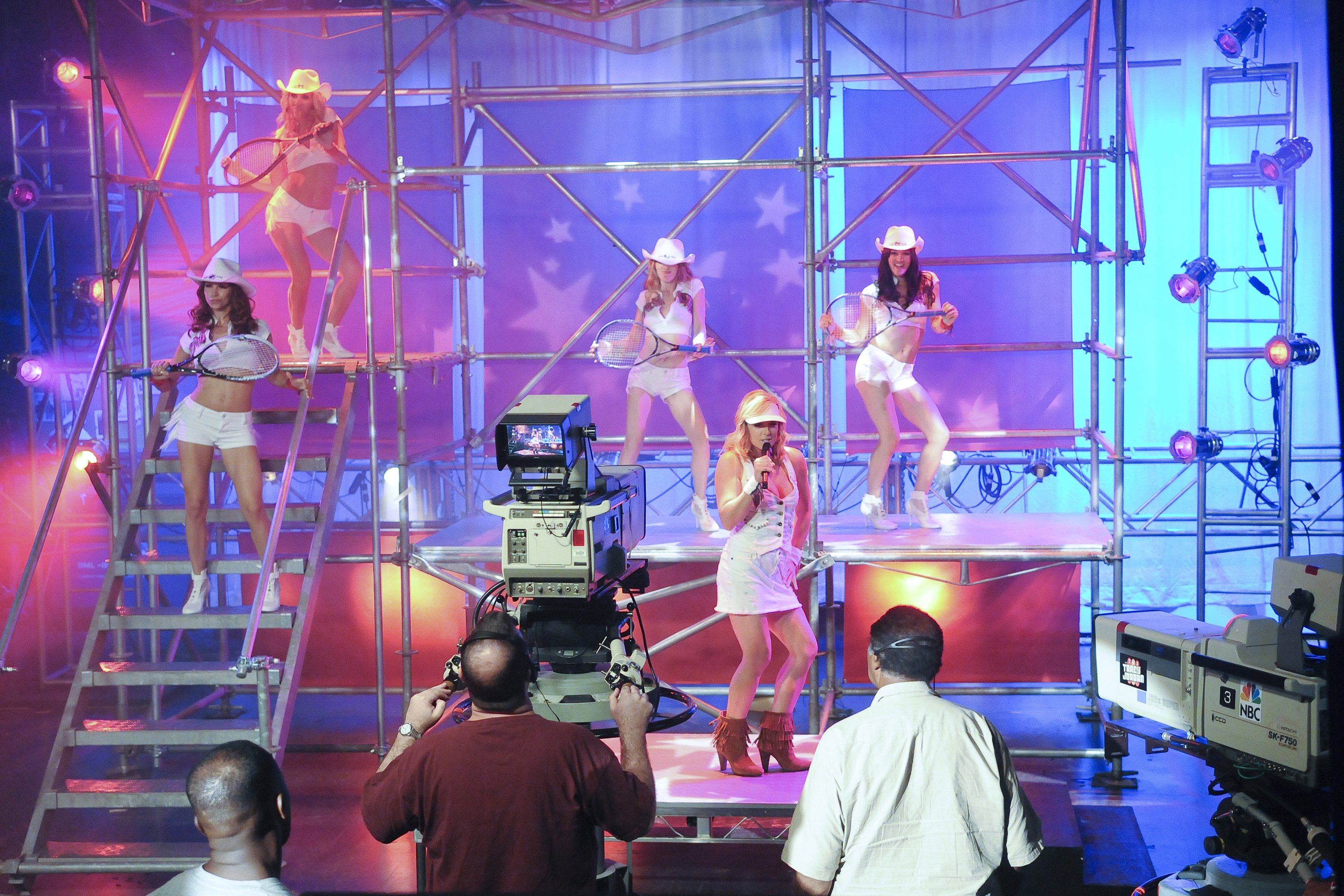
Tina Fey and composer Jeff Richmond created several brilliant parodies for 30 Rock (“Muffin Top,” “Werewolf Bar Mitzvah”), but “Tennis Night” impressively walks a very thin satirical tightrope. A spoof of the Sunday Night Football theme, it successfully skewers heartland America while flaunting the hypocrisy and cynically commercial aims of its East Coast singer, actress/narcissist Jenna Maroney (Jane Krakowski), and her parent company, a fictional NBC.
Promoting a minor tennis tournament to a male demographic favoring physical contact and scantily-clad women, Jenna gleefully hurls a mix of red-meat buzzwords and red-state stereotypes at her target audience as she dances in “sexy” tennis and cowgirl outfits: “It’s Tennis Night in America/Got some buds and some brews, it’s gonna be a fight/So put down your meth, slip on your whites/’Cause here in Real America it’s Tennis Night!”
Over the next minute, Jenna cheerfully serves up some tennis-themed innuendo, disses New York and exalts “the American way” as announcers hype a match between two all-consonants Eastern European names. By Jenna’s final “Hee haw!” a simple country song trying to make mid-level tennis exciting has turned into an ironic celebration of cheap sex and even cheaper patriotism, as well as show-biz folks who are all too willing to deploy them for commercial gain. In the end, nobody looks good, no matter which America they call home.
“One Track Lover” from Garth Marenghi’s Darkplace
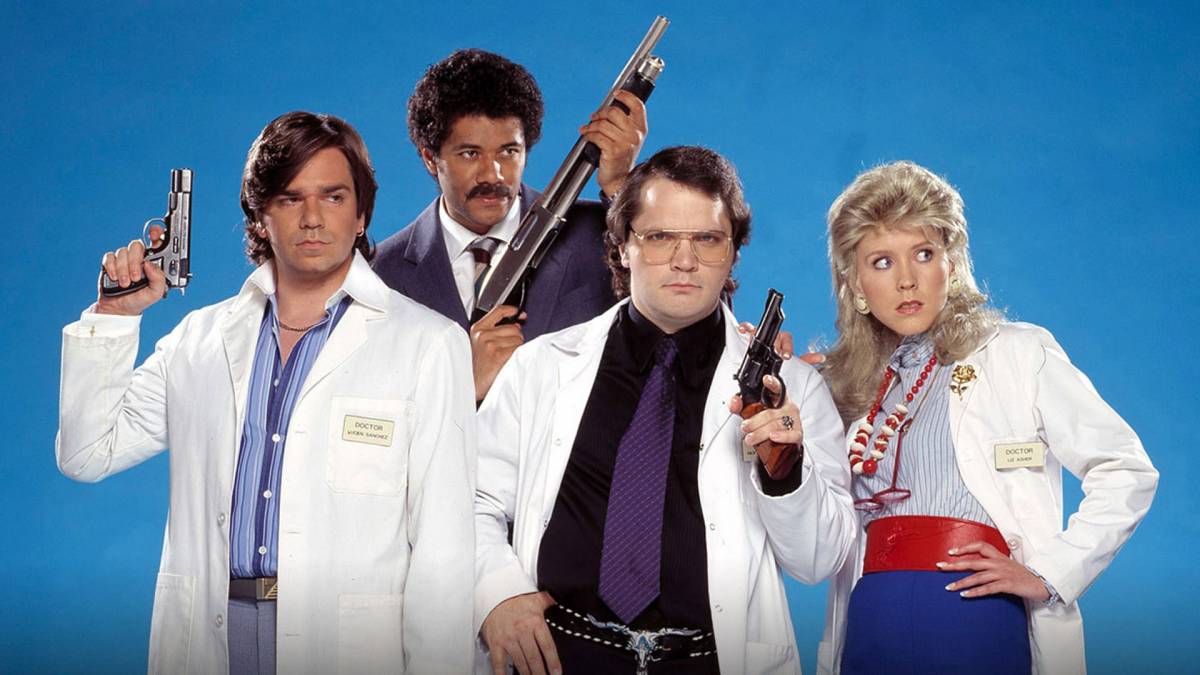
Matt Berry is enjoying an increasingly higher profile in the United States thanks to his role in FX’s What We Do in the Shadows, but he’s been a comedy giant in Britain for over a decade with shows like Snuff Box, The IT Crowd and Toast of London. He’s also a musician working with folk, prog and ambient influences. When he combines his two passions, the results are pure British surrealism. One of his early gems is “One Track Lover” from Garth Marenghi’s Darkplace.
A synopsis can’t do justice to this show’s high-concept, hallucinatory wackiness, but in a nutshell, Darkplace is a horror parody. It’s presented as episodes of a lost ‘80s TV series written by Garth Marenghi (Matthew Holness), an egotistical master of the macabre in the Stephen King/Wes Craven mold who also stars in the show. The action takes place in a hospital that stands over the gates of Hell and is subject to all kinds of supernatural evil. Doctors carry shotguns along with their stethoscopes.
Berry plays actor Todd Rivers in the role of Dr. Lucien Sanchez. In the final episode, he falls for a patient who is infected by an alien gas that is literally turning her into broccoli. But before that, despite giving no prior evidence of an interest in singing, Sanchez launches into an ode to unrequited love for a co-worker. The scene morphs into a music video featuring deadly serious ‘80s dance moves, looking lost through rain-streaked windows, a keyboard solo that sounds like a guitar on “flute” setting and a guest rap verse that is gloriously bad.
The song is cut off halfway through when Sanchez snaps out of a dream, but there’s a longer version with a painfully slow breakdown and racy outro. “One Track Lover,” like its parent show, seems to just do whatever it pleases.
“Can I Borrow a Feeling?” from The Simpsons
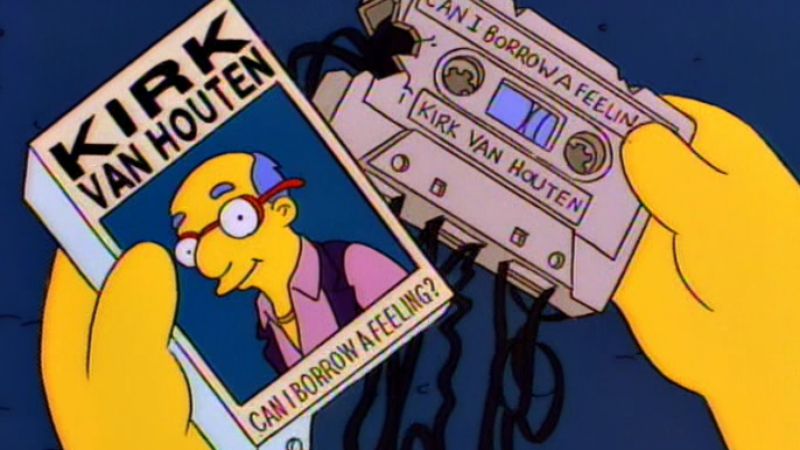
Maybe it’s difficult to appreciate how tonally ambivalent early Simpsons episodes could be, accustomed as we are to today’s mashup of moods. The Simpsons could get dark.
In the Season 8 episode “A Milhouse Divided,” Marge and Homer throw a dinner party for assorted Springfield couples, including the parents of Bart’s friend, Milhouse. Kirk and Luann Van Houten enter arguing, trade bitter insults over dinner and leave divorced. Kirk channels his pain into a demo tape which he hopes will make him famous via local AM radio. Later in the episode, he sings “Can I Borrow a Feeling?” to Luann. In what was then surprising for a mainstream cartoon, he fails to win her back.
We hear just one chorus of the song, which I imagine is the only track on his demo. After all, cash-poor Kirk surely couldn’t afford more than one recording session at late-‘90s rates (he seems to have spent his entire budget on the cassette cover).
The complete lyrics are: “Can I borrow a feeling?/Could you lend me a jar of love?/Hurtin’ hearts need some healin’/Take my hand with your glove of love!”
We can assume that Kirk himself wrote these words, and not only because they’re terrible. They reveal a profound self-pity, as well as the lack of self-esteem and fear of commitment beneath it. Kirk’s desire to merely borrow his wife’s love, not keep it, is beyond pathetic; he clearly doesn’t expect to hold anyone’s attention for long. As to why he asks for love in a jar, I assume it’s a subconscious allusion to how he gets most of his meals as a newly single person. And then there’s “your glove of love.” We can only speculate why Kirk needs this protective layer, and what that says about his fear of intimacy.
But the real mystery lies in imagining what Kirk’s demo tape sounds like. He sings “Can I Borrow a Feeling?” with a standard lounge/wedding band laying down mellow, late-‘70s yacht rock. He certainly didn’t reproduce this arrangement in the studio (again, the whole money thing). Does Kirk play an instrument on the recording? Does he even know how? Is there a drum machine involved? Backing vocals?
For what it’s worth, Kirk and Luann were remarried in Season 19. This song had nothing to do with their reconciliation.
“Things in My Jeep” from Pop Star: Never Stop Never Stopping
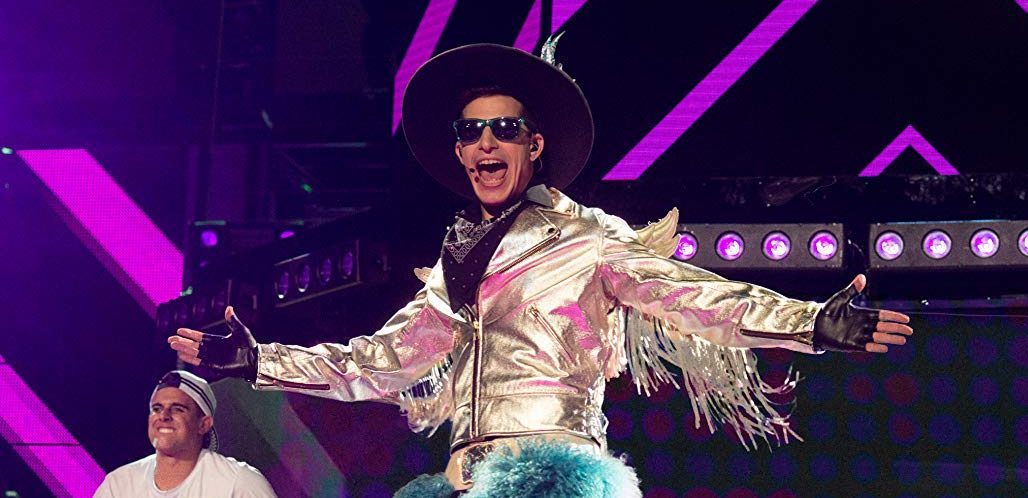
From their early web-based shorts to their post-Saturday Night Live projects, The Lonely Island (Andy Samberg, Jorma Taccone and Akiva Schaffer) have created masterful parodies thanks to a loving attention to detail. Equally interested in programming beats as in joke construction, they end up with brilliantly absurd sketches that simultaneously work as legitimate songs. This talent is arguably at its best in their boy-band spoof, Pop Star: Never Stop Never Stopping.
Pop Star boasts several epic set pieces: the sex-as-counterterrorism banger “Finest Girl (Bin Laden Song)”; the anthem to false modesty “I’m So Humble”; and the “profound” finale, “Incredible Thoughts.” However, a smaller moment, almost a throwaway joke, manages to highlight a point on a character arc while poking fun at the cliched advice writers often get to seek the universal through the personal.
Kid Brain (Schaffer), disgruntled ex-member of the Style Boyz, is so stung by his lack of recognition as a lyricist and the breakout solo stardom of former bandmate Conner4Real (Samberg) that he releases a ludicrously personal single in a doomed effort to connect to the masses.
“Things in My Jeep” is exactly that—a list of everything in his Jeep:
Boxing gloves, condoms and blue-blockers
Dress shoes, a Sharpie and three quarters
A football, hacky sack, frisbee in the back and a baseball cap
Two folding chairs, adirondack
And a mini cooler filled with healthy snacks
Why did it fail? Apparently, not many Style Boyz fans travel with a copy of Steve Martin’s Shopgirl: A Novella. As rapper Nas explains, “I didn’t really relate to that song because, you know, I had different things in my Jeep than he had in his Jeep.” Lesson learned.
“Song for Marcus Garvey” from Girls

There is no actual song for Marcus Garvey—it’s just a title. The details are mercifully left to the imagination.
In the Season 4 episode “Close Up,” folk poseurs/fame-seekers Marnie Michaels (Allison Williams) and Desi Harperin (Ebon Moss-Bacharach) argue over a setlist for an important gig. As Desi plugs his own material, the faux-profound “Song for Marcus Garvey” stands out among other daffy contenders like “Whoa, Wow, Wonderful.”
Garvey, a controversial Jamaican political activist, is an inspired choice as a subject for a song to be sung by two naive, privileged hipsters. In just four words, Girls creator Lena Dunham and her writers crack open the door to a world of oblivious twenty-something entitlement.
You can almost see Desi’s thought process. He was savvy enough to avoid the low-hanging fruit of cultural figures—he probably gave himself points for avoiding obvious choices like Che Guevara. Maybe he read just enough on Garvey to convince himself that the world needed to hear his hot take on the Back to Africa movement.
Throughout Girls, Marnie’s awkward attempts at breaking into the music business are almost transcendent in their lack of self-awareness. That quality is only amplified when paired with Desi’s own brand of narcissism. It’s easy to imagine that “Song for Marcus Garvey” would be their train-wreck masterpiece. Better to imagine than actually listen.
“Just You” from Twin Peaks
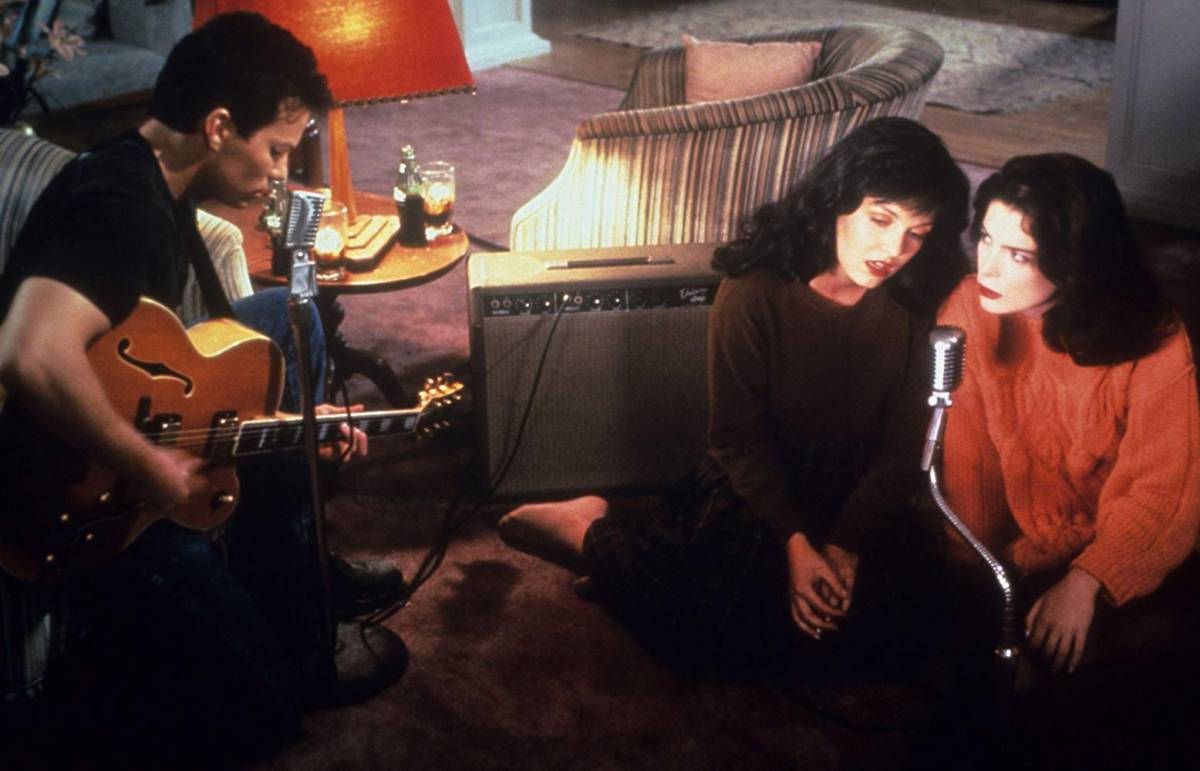
This song is infamous among certain sectors of Twin Peaks fans, most likely for its nakedly naive presentation in Season 2, which borders on camp. But heard and seen in context, it perfectly harnesses the dream logic and sense of paradox now recognized as trademark David Lynch. It also neatly captures the confusion and desperation of its singer, James Hurley (James Marshall), in the wake of the death of Laura Palmer (Sheryl Lee), the girl he couldn’t keep or even understand.
Written by Lynch and his stalwart composer Angelo Badalamenti with input from Marshall, the song is intended to be painfully idealistic, from the boilerplate ‘50s chord progression to its repetitive refrain, “Just you and I/together, forever in love.” It’s also laced with an irony that completely bypasses its singer. James sings “Just You” accompanied by his current girlfriend, Donna (Lara Flynn Boyle) and Laura’s cousin Maddy (also played by Lee), and he develops an increasingly intense emotional connection with Maddy as he plays. But he’s singing about monogamous love to two different girls, inspired by the haunting memory of a third, one who could never love him alone and whose problems were beyond his comprehension. Perfect couples and perfect clarity are hard to come by in Twin Peaks.
The song’s reappearance in Part 13 of Season 3 alters its thematic resonance to devastating effect. Just as Lynch uses the original series’ iconic coffee and pie in The Return as markers of how far away Special Agent Dale Cooper actually is from his spiritual “home,” the reprise of “Just You”—the performance of which could very well be taking place inside Cooper’s projection of the town of Twin Peaks twenty-five years after his initial visit—helps to reinforce this ambiguity. If this is really James, then James appears to be stuck in the past, still traumatized by Laura’s death. If this is Cooper’s idea of James, then James embodies another of Cooper’s frustrated attempts to return to an idealized sense of self instead of acknowledging his true nature.
It’s easy to dismiss “Just You” as just another nostalgic ‘50s mood piece, but Lynch never invokes such nostalgia without acknowledging its dark side—in this case, an inability to move past trauma and begin the process of healing.
“Please Mr. Kennedy” from Inside Llewyn Davis
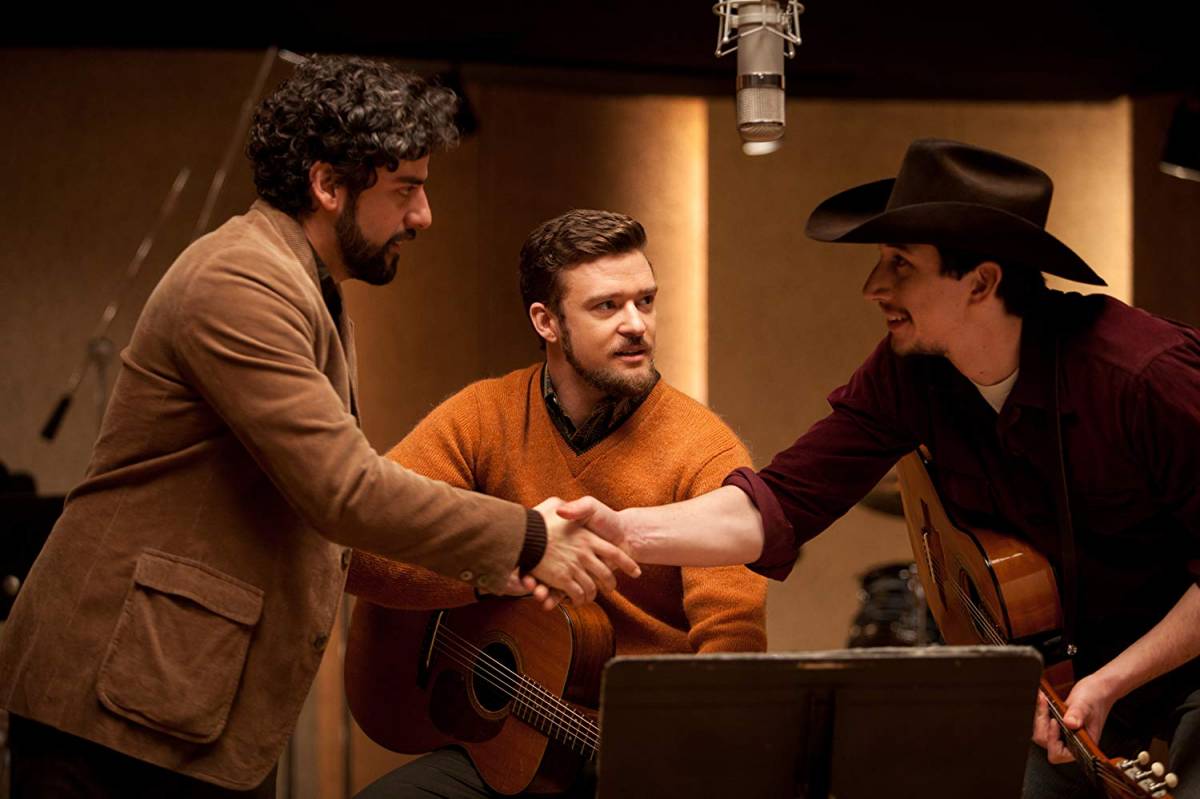
Over three-plus decades, Joel and Ethan Coen have created a small universe of fictional content within their own films, including fake movies, albums, TV shows, books and commercial products. Each one either reveals character, pushes the plot along, provides cultural commentary or points toward deeper underlying themes.
Inside Llewyn Davis’ title character (Oscar Isaac) is a struggling, grief-stricken, arrogant folksinger in Greenwich Village in the early 1960s. Dogged by bad luck, poor choices and stubbornness, he finds himself playing for a quick payday on a session for a novelty song written by Jim (Justin Timberlake), a fellow folkie he doesn’t respect. Faced with the challenge of writing a hit protest song on a topical issue, the Coens collaborated with music producer T-Bone Burnett, Timberlake, Isaac and co-star Adam Driver on the charmingly bad “Please Mr. Kennedy.”
Burnett confirmed the basic premise in an interview with The HuffPost’s Mike Ryan:
Ryan: The lyrics of “Please Mr. Kennedy” tell the story of a man who is afraid that President John F. Kennedy is going to send our protagonist into outer space against his will. A ludicrous notion considering that people who go into outer space generally want to go into outer space.
Burnett [Laughs]: That’s the idea. Exactly. […] It is a joke song, but here’s the thing … even if a song is supposed to be bad in a film, it still has to be great.
It’s not Bob Dylan—which is the whole point. In the world of the film, Isaac’s and Timberlake’s overly earnest vocals, Adam Driver’s goofy doo-wop outbursts and the song’s gimmicky countdowns make it a hit. In our world, behind the hokey tone and the dubious lyrical conceit is a sobering irony, considering what was to come. By the end of the ‘60s, there would be more worthwhile things to protest.
Those are Brian’s favorite “fake” songs. What would be yours? Let us know in the comments!

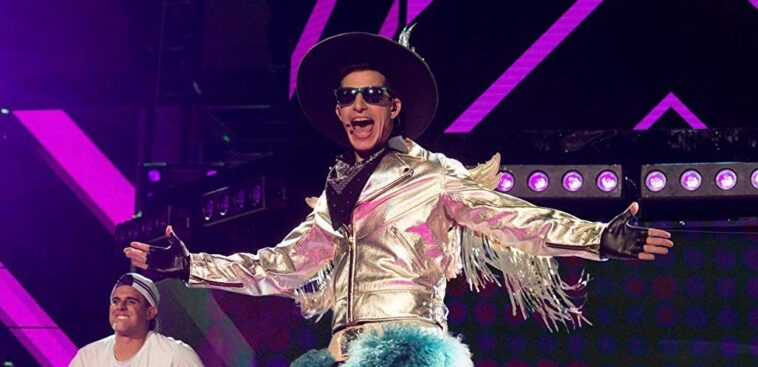
30 Rock was mocking the NBC “SUNDAY Night Football” theme, not the ESPN “Monday Night Football” theme
Yes, you’re right, fittentrim. Thanks for pointing that out!
Super fun subject, and a great article about it! Infant Sorrow’s “We’ve Got to Do Something” is one of my favs in the category.
Teenage suicide (don´t do it) by Big Fun.
From “Heathers”.
Just finishing a marathon rewatch of LOST.
Gotta give props to ‘Y’all Everybody’ by Drive Shaft the ultimate smack-head stadium rock anthem.
I think it is “You All Everybody” isn’t it? Or are there commas? I feel like mentally I insert commas: You, All, Everybody? No, probably it would be You All, Everybody…or is it in fact y’all? Doesn’t make sense any way you parse it, honestly
Everything in The Rutles mockumentary.
That Thing You Do from the movie of the same name
How could “Scotty Doesn’t Know” not make this list?!?!